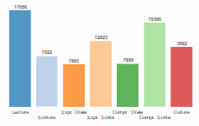| Grammar |
SUKI AND KIRAI (好き / 嫌い)
SUKI (好き) and KIRAI (嫌い) are used respectively to express appreciation and depreciation of something or someone. Those two な adjectives are preceded by the particle GA が, sometimes は WA (more details at the end of the document).
SUKI
好き means “appreciated,” “likable,” etc. It can be used to translate “I like…”. With a noun, we should literally understand “noun + is appreciated.”
| Watashi wa ongaku ga suki desu. |
| I love music. |
Literally: in my case, music is appreciated.
| Otouto wa banira aisukuriimu ga suki da. |
| My little brother likes vanilla ice cream. |
If it's a verb, it must be nominalized by adding KOTO (こと) or NO (の) after its plain form (dictionary form). We can then say, “to like + verb.”
| Watashi wa doramu o tataku koto ga suki da. |
| I like playing drums. |
Literally: In my case, the fact of playing drums is appreciated.
| Sutan san wa anime o miru koto ga suki desu. |
| Stan likes watching anime. |
To say “to love someone,” の こと is added after the person’s name to highlight the information.
| Kanojo (no koto) ga suki. |
| I love her. |
KIRAI
KIRAI (嫌い) means “dislikable.” It's used to say, “I don’t like…”. Be careful, despite its appearance, it’s not an い adjective, but a な adjective.
| Watashi wa suugaku ga kirai da. |
| I do not like mathematics |
| Haha wa uso ga kirai desu. |
| My mother does not like lies. |
As we did for 好き, we nominalize a verb by adding the particle こと or の to its plain form. We can then say, “don’t like + verb.”
| Ashi ga osoi kara hashiru no ga kirai na n da. |
| I don’t like running because I run slowly. |
| Aoki san wa shinbun o yomu koto ga kirai desu. |
| Mr. Aoki does not like reading newspapers. |
To say “don't love someone,” you can also add のこと after the person’s name to emphasize the information.
| Omae no koto nanka kirai da! |
| You, I hate you! |
Difference between WA (は) and GA (が) in the structure
To explain the difference between the particles は and が, let’s compare two sentences.
| Sakana ga suki desu. |
| I like fish. |
| Sakana wa suki desu. |
| Fish, that’s what I like. |
The difference is subtle. With が, we insist on the subject of the appreciation. We like fish (and nothing else). Whereas with は, the fish becomes the topic of the sentence, and the information that follows is highlighted. In a context where we were talking about meat, vegetable and fish for example, は puts a stress on fish as the element we like “compared to others.”
DAI (大) before SUKI and KIRAI
It's also possible to add 大 before 好き and 嫌い. It reinforces the feeling of appreciation or depreciation (大好き = to love, to enjoy a lot, etc. / 大嫌い = to hate, etc.) The kanji 大 means “large / big.”
| Nihongo o benkyou suru no ga daisuki desu! |
| I love studying Japanese! |
| Kare wa nattou ga daikirai da yo. |
| He hates nattou! |




















Clinch
Element
Look at carefully the grammatical point のだ/のです
http://www.japan-activator.com/en/lessons/grammar/article/id/90
I hope it will help you.
嫌い <大嫌い
To dislike < to hate
Clinch
お願いします
Also, in the last example, the sentence "彼は納豆が大嫌いだよ" translates to "He hates nattou!"